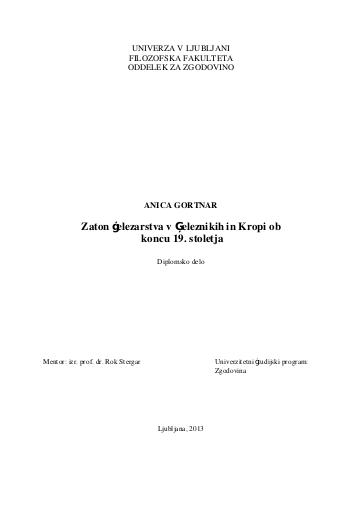
/
Thesis and textbooks
/
Graduate Thesis
Zaton železarstva v Železnikih in Kropi ob koncu 19. stoletja
The end of ironwork in Železniki and Kropa at the end of 19. century

Author(s):Anica Gortnar
Co-author(s):Rok Stergar (ment.)
Leto:2013
Publisher(s):Univerza v Ljubljani, Filozofska fakulteta, Ljubljana
Language(s):slovenščina
Type(s) of material:text
Keywords:železarstvo, žebljarstvo, industrijska revolucija, kovači, žeblji, ironwork, nail making, industrial revolution, blacksmiths, nails
Rights:

This work by Anica Gortnar is licensed under Creative Commons Attribution-NonCommercial-NoDerivs 4.0 International
Files (1)

Name:gortnar.pdf
Size:4.35MB
Format:application/pdf
Permanent link:https://hdl.handle.net/11686/file9592
Description
The diploma thesis explains the reasons for crisis in iron industry in Železniki and Kropa and, consequently, its decline. The purpose of this research is also to present how the crisis influenced the local population. For many years, ironwork and nail making had been the main industry branch and the main source of earnings of the inhabitants of Železniki and Kropa. When the industrial revolution and the development of industrial production emerged, making nails by hand could not bear the increased competition of machine production. Industrial development in surrounding areas had a negative impact on Železniki and Kropa, which both stayed focused on handmade production. Additionally, the development of railway system caused the stagnation in towns, which were not included into the railway area. The decline of iron industry in these towns was also a consequence of merging the Carniolan ironworks into Kranj Industrial Corporation in which Železniki and Kropa were not included. Gradually, the
ironwork started to decline. Consequently, the blacksmiths found themselves in poverty, since they did not have any opportunities to work and earn money. The crisis had an influence on population dynamics. The attempts to save the declining ironworks were unsuccessful. At the turn of the century, the blast furnaces definitively stopped functioning. The ironwork cooperative managed the nail making craft in Kropa to keep working, but in Železniki that decayed as well.
Metadata (12)
- identifierhttps://hdl.handle.net/11686/20245
- title
- Zaton železarstva v Železnikih in Kropi ob koncu 19. stoletja
- The end of ironwork in Železniki and Kropa at the end of 19. century
- creator
- Anica Gortnar
- contributor
- Rok Stergar (ment.)
- subject
- železarstvo
- žebljarstvo
- industrijska revolucija
- kovači
- žeblji
- ironwork
- nail making
- industrial revolution
- blacksmiths
- nails
- description
- Diplomsko delo skuša predstaviti, zakaj je prišlo do krize železarstva v Železnikih in Kropi ter posledično do njegovega zatona. Namen pa je tudi pokazati, kako je ta kriza vplivala na tamkajšnje prebivalstvo. Dolga leta je fužinarstvo in žebljarstvo predstavljalo glavno gospodarsko panogo in glavni vir zaslužka prebivalcev tako v Železnikih kot v Kropi. Z industrijsko revolucijo in razvojem industrijske proizvodnje pa tamkajšnje ročno izdelovanje žebljev ni več moglo konkurirati strojni izdelavi. Industrijski razvoj v drugih krajih je negativno vplival na Železnike in Kropo, ki sta ostala na ročni izdelavi. Svoje je naredil tudi razvoj železniškega omrežja, ki je povzročil, da so kraji, ki jih je železnica obšla, začeli stagnirati. Prav tako pa je na propadanje železarstva v obravnavanih krajih vplivalo tudi združevanje gorenjskih železarn, torej nastanek Kranjske industrijske družbe, v katero Kropa in Železniki nista bila vključena. Počasi je obrt zamirala in to je imelo velik vpliv na tamkajšnje prebivalstvo. Kovači so doživljali hudo stisko. Dela ni bilo, posledično ne zaslužka in mnogi so se znašli na robu preživetja. Kriza je vplivala na prebivalstveno dinamiko. V obeh krajih se je ob koncu 19. stoletja občutno zmanjšalo število prebivalstva. Poskusi, da bi rešili propadajoče železarstvo, so bili dokaj klavrni in na prelomu stoletja so plavži dokončno ugasnili. Kljub vsemu pa se je v Kropi po zaslugi žebljarske zadruge ohranilo žebljarstvo, medtem ko je v Železnikih propadlo tudi to.
- The diploma thesis explains the reasons for crisis in iron industry in Železniki and Kropa and, consequently, its decline. The purpose of this research is also to present how the crisis influenced the local population. For many years, ironwork and nail making had been the main industry branch and the main source of earnings of the inhabitants of Železniki and Kropa. When the industrial revolution and the development of industrial production emerged, making nails by hand could not bear the increased competition of machine production. Industrial development in surrounding areas had a negative impact on Železniki and Kropa, which both stayed focused on handmade production. Additionally, the development of railway system caused the stagnation in towns, which were not included into the railway area. The decline of iron industry in these towns was also a consequence of merging the Carniolan ironworks into Kranj Industrial Corporation in which Železniki and Kropa were not included. Gradually, the ironwork started to decline. Consequently, the blacksmiths found themselves in poverty, since they did not have any opportunities to work and earn money. The crisis had an influence on population dynamics. The attempts to save the declining ironworks were unsuccessful. At the turn of the century, the blast furnaces definitively stopped functioning. The ironwork cooperative managed the nail making craft in Kropa to keep working, but in Železniki that decayed as well.
- publisher
- Univerza v Ljubljani
- date
- 2013
- type
- besedilo
- language
- Slovenščina
- rights
- license: ccByNcNd
- fileResource
Citirano v (1)
| Tipologija | Avtor(ji) | Naslov | Kraj | Založba | Leto |
|---|---|---|---|---|---|
| 1.01 Izvirni znanstveni članek | Centrih, Lev | "Kaj naj storim v slučaju, da naši častiti zadružniki ne bodo hoteli povišati deležev?" : Konflikti v Prvi žebljarski in železo-obrtni zadrugi v Kropi in Kamni Gorici v letih 1924-1927 | Ljubljana | Inštitut za novejšo zgodovino | 2020 |